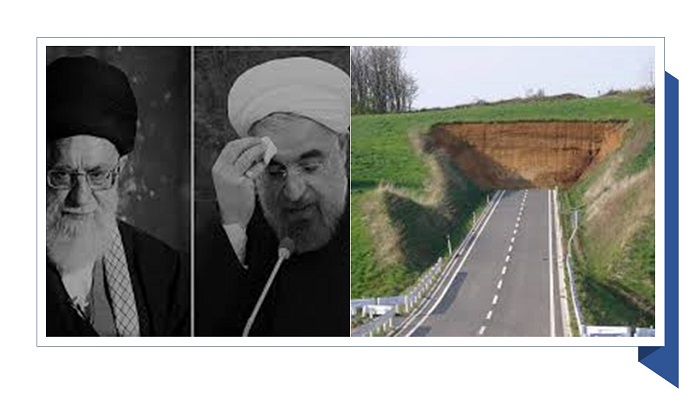
The Iranian regime is in a deadly dead-end
On Thursday, the website Modern Diplomacy published an article detailing the current crisis in Iran as it relates to Friday’s Majlis (parliamentary) elections. The piece describes the dead-end currently facing the regime and the importance of the elections in maintaining the appearance of legitimacy. It also calls on the European Union to support the Iranian people by joining the maximum pressure campaign against the regime.
Crises Facing the Regime
The article discusses crises in the domestic and international arena. Domestically, “it faces crippling economic crises and severe budget deficits, and on the other hand, injustice and lack of freedom have turned the Iranian society into a powder keg that can explode at any moment,” the article states, citing the November Uprisings as evidence of the widespread unrest in the country.
“In the international arena, the regime is also in a very weak position. Its warmongering policies and nuclear and ballistic missile program are under the magnifying glass and pressure of the international community. U.S. sanctions have added to the regime’s crises and put it in a deadlock,” the article adds.
Ali Khamenei called voting in the upcoming parliamentary elections “a religious obligation” on February 18https://t.co/LsdyW20xqt#Iran #BoycottIranShamElections #MEK @USAdarFarsi pic.twitter.com/Gt1nBupMkH
— MEK Iran (Mujahedin-e Khalq) (@MEK_Iran) February 20, 2020
Two Paths
The article argues that the Iranian regime needs money and that it can end economic protests with an influx of cash. This argument is flawed at its core, as anyone who followed the 2018 Uprisings can attest. The Iranian economy was broken long before the resumption of sanctions, and no amount of money will change the corruption and mismanagement that has led to the plundering of the nation’s wealth and resources. Additionally, the Iranian people are long past the point of simple economic grievances. Although the mullahs may well believe that lifting sanctions would end protests, they are mistaken in this as they have been mistaken about the will of the people for the past 41 years.
In any case, the article proposes two paths forward for the regime. The first would require it to comply with U.S. Secretary of State Mike Pompeo’s 12-point plan, which would include ending its nuclear and ballistic weapons programs and ceasing military involvement in other countries.
This option is unacceptable to the regime because it would show weakness to the United States and “cause its forces to collapse from within.”
The second option is “the path of contraction and confrontation,” the article states, and this is the path the regime has chosen. This path requires unity within the regime.
“This decision is aimed at buying time and is an investment in proxy wars in the region in order to force the U.S. to step back and lift sanctions. The regime hopes that in the next U.S. elections someone else will replace Donald Trump with a milder Iran policy,” argues the article.
The problem with this approach is that it relies on a unified government, and the Iranian people are not cooperating.
The Majlis Elections
The article goes on to explain the election system in Iran. The Guardian Council approves all candidates for office in Iran. This 12-person consists of six clerics, who are appointed by Supreme Leader Ali Khamenei, and six lawyers, who are nominated by the Judiciary Chief and confirmed by the Majlis. The Guardian Council in its entirety answers to Khamenei, and the Judiciary Chief is appointed by Khamenei, so all roads lead to the Supreme Leader.
Rouhani terrified of low voter turnout on eve of parliamentary elections#Iran#BoycottIranShamElectionshttps://t.co/0Ag6uDmFXG
— People's Mojahedin Organization of Iran (PMOI/MEK) (@Mojahedineng) February 20, 2020
The article explains: “More than 16,000 people presented themselves as candidates for the legislative elections. More than 55% of these candidates were disqualified by the Guardian Council. Some 90% of the so-called reformists’ candidates are among the disqualified. The Guardian Council even disqualified 90 members of the current Majlis (Parliament). State media report that from 290 seats in Majlis, 200 seats have already been assigned.”
Election Boycott
“One way out for the regime is to show ‘massive’ participation of people in the elections,” the article states. “On February 5, 2020, the Supreme leader for the first time begged the people to participate in the elections, ‘even if you disagree with me.’ Despite the removal of the so-called reformist candidates, the regime’s President Hassan Rouhani also begged in a speech on the anniversary of the Iranian revolution on February 12, 2020, for people to participate in the elections,” it continues.
A 10:30 am report from Lorestan indicates a low voter turnout in the province. In Khorramabad, there are about 10-12 people at the polling station. An MEK activist recording the scene said, "The sole solution for Iran is to overthrow the regime." pic.twitter.com/wmbO6aMQh8
— MEK Iran (Mujahedin-e Khalq) (@MEK_Iran) February 21, 2020
President-elect of the National Council of Resistance of Iran (NCRI) Mrs. Maryam Rajavi and the MEK Iran have called on the Iranian people to boycott the elections, and the movement is gaining momentum, with a recent poll showing that 83% of the population planned to stay home on Election Day.
The second path is doomed to fail if the Iranian people stay home on Friday as they have said they will. That leaves the regime with no options.
